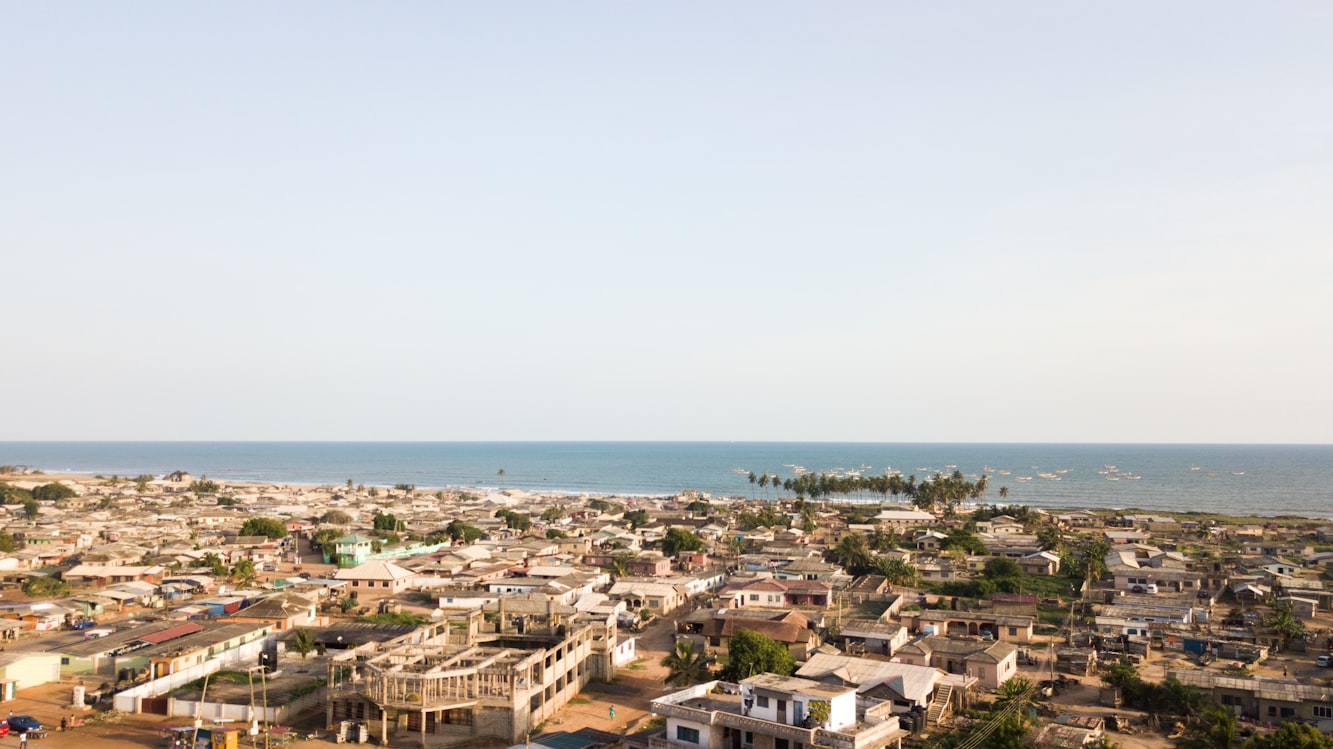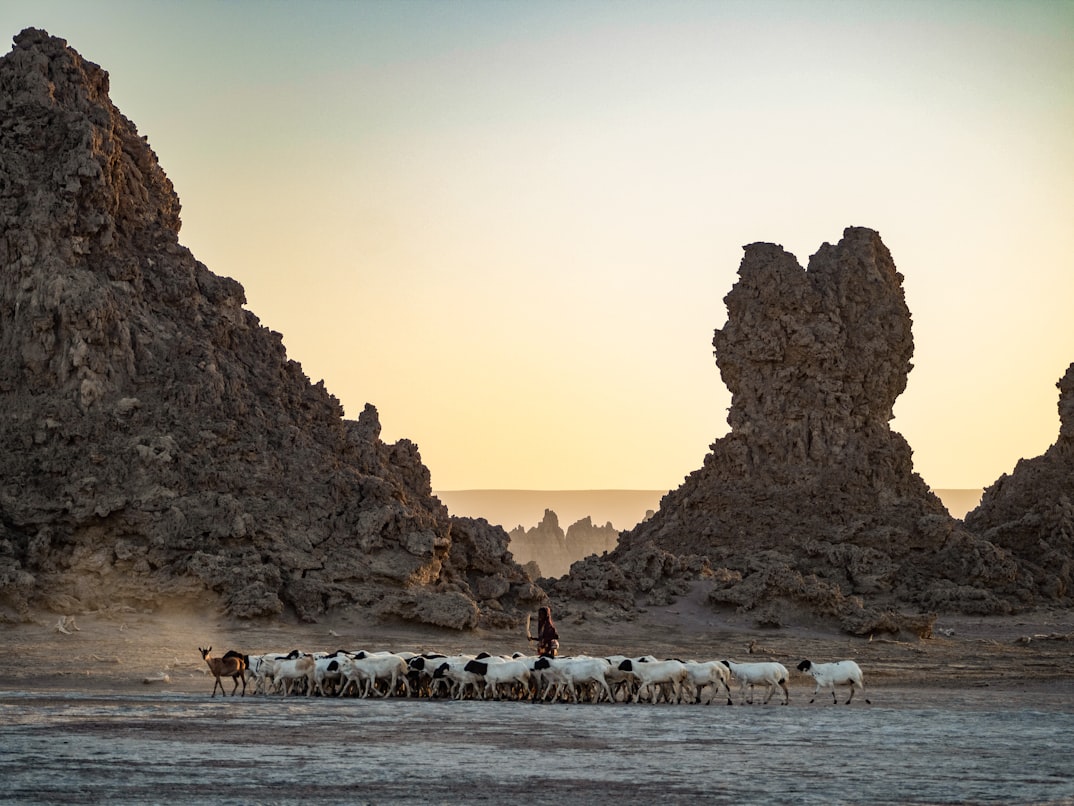Top Attractions
Djibouti offers an array of striking natural wonders that captivate adventure seekers and nature lovers alike. Lake Assal, one of the saltiest and lowest lakes on Earth, dazzles visitors with its turquoise waters surrounded by salt flats and volcanic rock. The alien landscapes of Lac Abbé, marked by steaming limestone chimneys and flamingos wading through shallow waters, feel like another planet and are best visited at sunrise or sunset for a surreal experience. For those interested in marine life, the Gulf of Tadjoura provides exceptional snorkeling and diving, particularly in the renowned Seven Brothers Islands, where you can swim alongside whale sharks, manta rays, and vibrant coral reefs. The bustling capital, Djibouti City, offers cultural immersion with its markets, mosques, and colorful street scenes, while Day Forest National Park provides a refreshing high-altitude escape into green juniper forests.
Local Dishes
Djiboutian cuisine reflects its multicultural heritage, combining Somali, Afar, Yemeni, and French influences. A must-try dish is Skudahkharis, a traditional spiced rice and meat dish often served with lamb or goat. Ful medames, a hearty fava bean stew eaten for breakfast, is commonly paired with khubz (flatbread). Sambusa, a fried pastry filled with spiced meat or vegetables, is popular as a snack or appetizer. Grilled fish seasoned with cumin and chili is a staple along the coast, especially at roadside stalls and local eateries. To finish, try bananas with honey or traditional halwa, a sticky sweet made with sugar, ghee, and cardamom.
Transportation Tips
Traveling in Djibouti requires a bit of planning due to limited infrastructure. Taxis are available in Djibouti City but often lack meters, so it's important to agree on a fare beforehand. Shared minibus taxis called "bush taxis" run between towns but can be crowded and irregular. Renting a 4x4 vehicle is highly recommended for visiting remote areas like Lac Abbé or the Goda Mountains, and a driver with local knowledge can be invaluable. The country does not have a reliable public bus network, so most rural travel must be arranged in advance. In the capital, walking is feasible for short distances, though be prepared for high temperatures during midday.
Budget Travel Tips
Djibouti is not traditionally a budget destination, but there are ways to reduce costs. Travelers can save money by staying in simple guesthouses or mid-range hotels outside of the city center. Eating at local restaurants and markets, where dishes like rice and stew or grilled meats are affordable, is a great way to experience the culture without overspending. Traveling in groups to share the cost of guided tours or vehicle rentals can significantly lower the price of excursions. Booking ahead for major attractions and opting for package deals can also yield savings.
Safety Info
Djibouti is generally stable and safe for tourists, especially in and around Djibouti City and popular attractions. However, travelers should exercise caution near border areas with Eritrea and Somalia. Petty crimes like pickpocketing can occur, so it’s important to keep valuables secure. Roads in rural areas can be rough and poorly lit, so avoid night travel outside the capital. Heat exhaustion and dehydration are risks in the desert climate, so always carry water and sun protection. Local authorities are welcoming, but it's advisable to respect military zones and photography restrictions.
Cultural Etiquette
Djibouti is a Muslim-majority country, and visitors should dress modestly, especially in rural areas and during religious holidays. Greetings are important; a respectful handshake and use of formal titles are appreciated. Public displays of affection should be avoided, and alcohol should be consumed discreetly, as it’s only available in select establishments. Removing shoes before entering someone’s home and using the right hand for eating and passing items are considered polite. Showing respect for local customs and religious practices will earn goodwill and enhance your travel experience.
Travel Style Fit
Djibouti best suits adventure travelers, scuba divers, and those with a strong interest in geology and off-the-beaten-path destinations. It’s ideal for explorers who thrive in arid landscapes, appreciate unique ecosystems, and are willing to trade luxury for unforgettable natural sights. Cultural enthusiasts who enjoy connecting with communities in less-touristed countries will also find Djibouti rewarding. While infrastructure can be challenging, the country’s surreal landscapes and marine treasures make it a destination worth the effort.

Best Time to Visit
The ideal time to visit Djibouti is between November and February when temperatures are more tolerable, ranging from 25°C to 30°C (77°F to 86°F). During this period, outdoor exploration is more comfortable, and marine visibility for diving and snorkeling is excellent. The hottest months, from May to September, can see temperatures soar above 40°C (104°F), making travel difficult, especially in desert regions. Whale shark sightings peak between November and January, making it a perfect window for marine enthusiasts.
Accommodation Recommendations
For budget-conscious travelers, Auberge Le Héron in Djibouti City offers simple rooms with basic amenities and a friendly local vibe—perfect for those looking to save while staying central. Another affordable option is Hotel Rayan, offering Wi-Fi, air conditioning, and easy access to downtown attractions.
For mid-range comfort, Acacias Hotel offers modern amenities including a pool, fitness center, and a shaded courtyard, all within reach of the city’s waterfront and cultural spots. Similarly, Hotel Les Palmes offers a blend of local character and Western comforts, ideal for travelers wanting a touch of luxury without a high price tag.
Luxury travelers will find solace in Djibouti Palace Kempinski, the country’s premier five-star hotel boasting exquisite sea views, world-class dining, spa services, and a private beach. It’s the perfect base for both business and leisure travelers seeking a refined experience.
Languages Spoken
Djibouti has two official languages: French and Arabic. French is more widely used in education and administration, while Arabic is often used in religious contexts. Local languages such as Somali and Afar are also commonly spoken among the population. English is not widely spoken, though some staff in hotels and tour agencies may understand basic phrases. Learning a few greetings in French or Somali can go a long way in building rapport with locals.
Currency
The official currency is the Djiboutian Franc (DJF). While major hotels and some tour operators accept credit cards, cash is the most common form of payment, especially in rural areas and markets. ATMs are available in Djibouti City but can be unreliable, so it’s advisable to carry enough cash when traveling to remote areas. U.S. dollars are sometimes accepted in tourist areas but should not be relied upon exclusively.
Common Traveler Mistakes to Avoid
One common mistake travelers make is underestimating the heat—hydration and sun protection are crucial. Many visitors also forget to bring enough cash when venturing outside the capital, where card services are scarce. Another error is assuming taxis are metered; fares should always be negotiated in advance. Lastly, some tourists miss out on Djibouti’s natural wonders by not planning transportation and guided tours in advance—last-minute arrangements can be unreliable and costly.
Essential Apps & Tools
Download Maps.me or Google Maps for offline navigation, as mobile coverage can be spotty in rural areas. WhatsApp is the preferred messaging app for staying in touch with local guides and hotel staff. XE Currency is helpful for quick currency conversions, and Google Translate can bridge communication gaps when encountering language barriers. Also, carry a flashlight app for areas with limited nighttime lighting, especially in less developed areas.
Suggested Itinerary Styles
A balanced 5- to 7-day itinerary works well in Djibouti. Start with a day or two in Djibouti City exploring markets and enjoying coastal seafood. Next, spend two days visiting Lake Assal and Lac Abbé, ideally with a guided overnight tour for sunrise and sunset photography. Dedicate at least two days to snorkeling or diving trips in the Gulf of Tadjoura, especially if you're aiming to swim with whale sharks. If time permits, a day trip to Day Forest National Park offers a cool contrast with its green hills and rare birdlife.
Fun Facts
Djibouti is home to one of the world's most unique geological features—Lake Assal, which sits at 155 meters below sea level, making it the lowest point in Africa. Despite its small size, the country is located at the junction of three tectonic plates, which gives rise to frequent, small-scale seismic activity. Djibouti's coastline is one of the best places in the world to swim with whale sharks, which visit seasonally in calm, warm waters. The country’s flag colors represent unity, peace, and the blood shed for independence, which it achieved from France in 1977.
